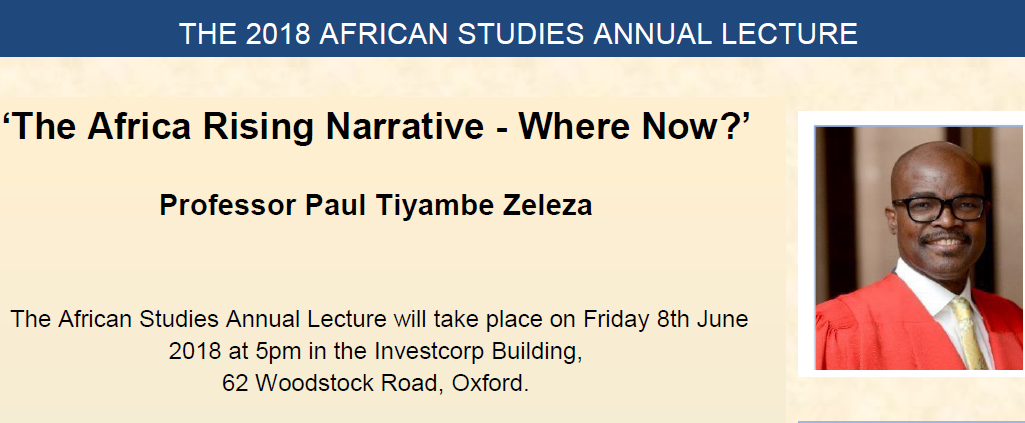 ‘Africa Rising’ is returning to the global public sphere. It has never really been a settled issue or ever off the debating agenda but this time, an African scholar of global tentacles has a chance to mount the podium in the same Oxford University where Halford Mackinder, for example, declared the ‘Geographical Pivot of History’ in 1904. Although Mackinder’s Geopolitics took an imperialist form, Geopolitics has since expanded to a critical dimension which allows for an emancipatory intervention on a matter as ‘Africa Rising’ now at the heart of that discipline.
‘Africa Rising’ is returning to the global public sphere. It has never really been a settled issue or ever off the debating agenda but this time, an African scholar of global tentacles has a chance to mount the podium in the same Oxford University where Halford Mackinder, for example, declared the ‘Geographical Pivot of History’ in 1904. Although Mackinder’s Geopolitics took an imperialist form, Geopolitics has since expanded to a critical dimension which allows for an emancipatory intervention on a matter as ‘Africa Rising’ now at the heart of that discipline.
The world must thus be all ears come June 8th, 2018 when Professor Paul Zelela, the Canadian educated African scholar and incumbent Vice-Chancellor of the Nairobi based United States International University Africa will be speaking to the topic “The Africa Rising Narrative – Where Now?” That attention must have to do with the historical conflict around and about the framing of Africa in theories, literature/films/cartoons, the traditional and social media, books and so on.

The framing business has been dominated by what some of its most sensitive observers have called the ‘preponderance of negativity’ believed to arise from a culture of systematic and deliberate selection or emphasis on the dramatic, conflictual and the dark without providing the social context to such facts in reporting the continent. This claim received its considered ultimate proof in the 2000 cover title ‘Hopeless Continent’ by The Economist. But, in what appeared to be a retraction, The Economist surfaced in 2011 with ‘Africa Rising’, a dramatic shift from ‘Hopeless Continent’ a decade ago. Although another Western magazine, Time had used that frame in March 1998, it was The Economist’s cover that attracted conceptual excitement, critique and all other manners of assessment. In 2012, Time also followed with a cover under the title ‘Africa Rising’. In 2014, the global consulting outfit, Mckinsey produced its thick report titled Lion on the Move. In 2016, it followed it up with the second volume of the report.

In 1998

In 2012
They have all left researchers, students of media geopolitics, African leaders and policy makers asking if the new narrative is a product of reflexivity or politics or both or even something completely new in the revisualisation of the continent. For instance, Dr.Toussaint Nothias whose PhD at Leeds University in the UK touched on ‘Africa Rising’ cannot see anything repudiating of the imagination of Africa as the ‘Heart of Darkness in all the new narratives such as ‘Africa Rising’ or ‘Hopeful Africa’. Rather, he sees discursive re-inscription of Africa in globalized neoliberalism in all of them in his 2014 essay “Rising’, ‘Hopeful’, ‘New’: Visualising Africa in the Age of Globalisation”. Professor Patrick Bond, the South African based academic raised a similar summative critique in his 2014 article titled “Social Scientists’ Failure of Analytical Nerve: ‘Africa Rising’ from Above, or Uprising from Below?”. So, ‘Africa Rising’ has had a highly contested, controversial conceptual history. It is as defective to its critics just as it is inviting to its admirers.
This is the background against which Professor Zelela would be speaking and attracting activists of different intellectual take-off points to the African Studies Centre at Oxford, come June 8th. Professor Zelela is absolutely a highly published scholar but his outing that is most likely to be cited in relation to this discussion must be his 2008 article “Dancing With the Dragon: Africa’s Courtship With China”.




























